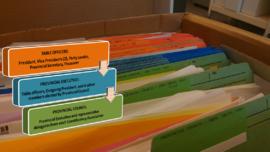- Series
- 1970 - 2003
The records in this series relate to the planning, organization, and execution of the provincial NDP conventions held to elect party executive and determine party policy and direction.
The provincial convention is perhaps the most important activity of the provincial NDP, alongside its election activities. Originally held annually (except in rare occasions) until 2001 when it became a bi-annual event, convention is where party policy is adopted and amended, discussion papers are circulated, reports from party executive and caucus members are heard, and elections for internal party positions are held. In addition, each year long-standing and active party members are selected by a committee to be inducted as Honourary Life Members (HLMs). Often during election years, the Federal NDP Leader would also attend the convention and address the BC provincial party members.
During the conventions, each electoral constituency would elect delegates to represent them at the convention, and submit any resolutions passed by their constituencies for consideration as Party policy. Constituency delegates at the convention would debate and vote upon policy (based on the submitted resolutions), as well as elect the party’s executive, made up of Table Officers (Party president, vice presidents, membership secretary, treasurer) and members-at-large. When necessary, the convention would also elect the party’s new leader. Each delegate would receive a convention kit upon arrival containing the minutes of the previous convention, reports from the party executives and standing committees, party financial reports, all policy to be considered that year, and other related materials. Conventions are traditionally presided over by the provincial party president, or by one of the vice-presidents, and tend to span several days. Important policy not able to be addressed or decided upon at convention may be referred to the Provincial Council for further discussion, and/or added to the resolutions under review at convention the following year. Over the years, many of the kits contained an explanation of Convention to new members (such as file 428-06, “1984 convention kit), which can be consulted for further information.
Convention organization was usually coordinated out of the provincial office, with one person tasked as the convention coordinator, supported by several committees, most notably the Convention Arrangements Committee (CAC) and the Resolutions Committee. In many cases, members of the provincial executive and internal party staff members (such as the Provincial Secretary, the Director of Organization, and/or the Director of Communications) would be members of the Convention Arrangements Committee, and would handle the coordination and planning of the event. The Resolutions Committee would receive resolutions sent in by constituencies (or submitted from regional conferences, as began occurring as of 1988), organize these into categories (such as Health, Economics, or Constitution and Party Affairs), and then determine an order of priority so the most pressing issues in each category would be given priority floor time. Constituencies could also submit Emergency Resolutions which were time-sensitive and generally related to recent provincial, national, or global events. Other convention organizing committees over time have included the Leadership Rules Committee, The Balloting Committee, the Credentials Committee, and the Harassment Committee.
Records in this series include correspondence, budget documents, drafts, convention kit materials and other public communications, memoranda and bulletins, meeting agendas and minutes, and other related materials.
